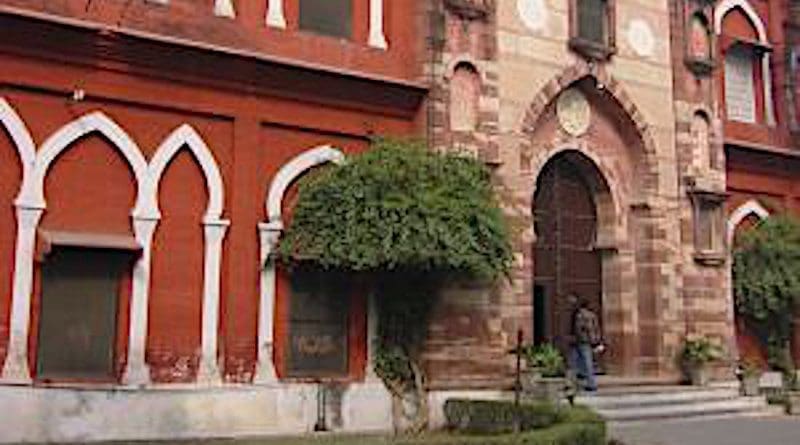Aligarh Muslim University: A Beacon Of Hope In A Neoliberal Dystopia – OpEd
By Yanis Iqbal
We live in socially ravaged times. Amid the Covid-19 pandemic, billionaires have accumulated more wealth, leaving the mass of humanity in swamps of misery and perennial precarity. With the ever-increasing concentration of power in the hands of the heartless few, there has been a major restructuration of ideological institutions, intended to marketize and commodify education. Taking into account this changing context, the centenary year of Aligarh Muslim University (AMU) is an important event. It provides us with an occasion to reflect on the history of a varsity dedicated to critical education and social justice, both of which are enemies of neoliberal capitalism.
Sir Syed Ahmad Khan: A Radical Reformer
The historico-cultural trajectory of AMU was fundamentally shaped by the personality of Sir Syed Ahmad Khan (17 October 1817- 27 March 1898). He established Aligarh Scientific Society (1864); translated forty European books dealing with different themes; established the Modern School at Ghazipur (1886) to promote and establish educational committees in northern India; established Muhammadan Anglo-Oriental Collage at Aligarh (1874) along the Oxbridge model, which in 1920 became AMU; and established the Muhammadan Anglo-Oriental Educational Conference (1886) for the promotion of western education among Indian Muslims.
Labeled by some as a “Muslim Marx”, he was one of the most radical modernizers of Islam during the 19th century who spoke against the virulent anti-science and anti-modernist stance of the orthodoxy; established an intellectual front against blind worship of tradition and backwardness and paved the way for personalities like Altaf Hussain Hali, Maulvi Muhammad Hussain Azad, Deputy Nazeer Ahmad, Shibli Nomani, Maulana Abul Kalam Azad and Allama Iqbal.
He reinterpreted religious texts in order to reconcile the demands of modern civilization with the teachings and traditions of Islam. Striving for the social, cultural and economic revival of his co-religionists, his motto was: “the more worldly progress we make, the more glory Islam gains.” Sir Syed’s ability to dialectically combine religion and scientific consciousness proved to be extremely productive in culturally-educationally enriching ghettoized Muslim communities.
Firstly, it unleashed the liberatory potentialities of Islam, allowing it to break free from the captivity of ultra-dogmatism. This theoretical widening of the meaning of religion still has the potential to create a comprehensive conception of justice, laden with sensibilities of sympathy and compassion. Secondly, through the use of pre-existing religious discourse, Sir Syed started with the here-and-now of Muslim consciousness, thus reducing the distantness of scientific learning and embedding it in emotional ecosystems.
While many frame Sir Syed as politically regressive, they ignore that his viewpoints were results of certain material circumstances forced upon by the colonial regime. As a result, his opinions kept changing with changing conjunctures. To take some examples, while some consider him as a religio-fanatic only supportive of Muslims, in his Gurudaspur speech (1883-84) he said, “I have used the word “nation” several times…By this I do not mean Muslims only. In my opinion all men are one and I do not like religion, community or group to be identified with a nation”.
Denigrated sometimes as a British stooge, Sir Syed was, in fact, only trying to work for the betterment of Muslims abjectly terrorized by imperialist plundering. To that end, he made temporary alliances with the British which, in the long run, strengthened the anti-colonial struggle as AMU became an institutional locus of student resistance against English imperialists
The “tactical” status of Sir Syed’s collaboration with the British is visible in his rejection of the culture of sycophancy promoted by the colonial authorities. The incident of the Agra Durbar of 1867 – well-known to the Indian community, and not just the Muslims – is representative of this.
Sir Syed had stayed away from the Durbar because Indians had been given seats inferior to the English. A medal was to be conferred on Sir Syed at that Durbar. Williams, the Commissioner of Meerut was later asked to present the medal to Syed Ahmad Khan at Aligarh railway station. Angered by this attitude of non-deference, Williams said that he was bound by government orders or he wouldn’t be presenting the medal to Sir Syed. Sir Syed accepted the medal, saying that he wouldn’t have accepted the medal, except that he, too, was bound by Government orders.
De-commodifying Education
From a brief discussion of Sir Syed’s world-view, it is clear that he advocated for a type of education consciously rooted in a well-defined social context. Conceptualizing education in such a historical materialist way inevitably entails its situatedness in a much wider panorama of deep-seated inequalities which need to be erased. Today, neoliberalism has led to an amnesiac understanding of education which fails to comprehend underlying, structural issues and instead locates the process of learning in an ahistorical vacuum. Consequently, education becomes a brutally standardized-homogenized system, operating in an abstract meritocratic maize completely ignorant of the concrete unevenness of class structures. AMU, a state university, is currently an antithesis of such a neoliberal dystopia, working against the logic of privatization and hyper-competitiveness. We need to protect universities like AMU and establish more educational institutions modeled after its operational logic since they help in de-commodifying education.

